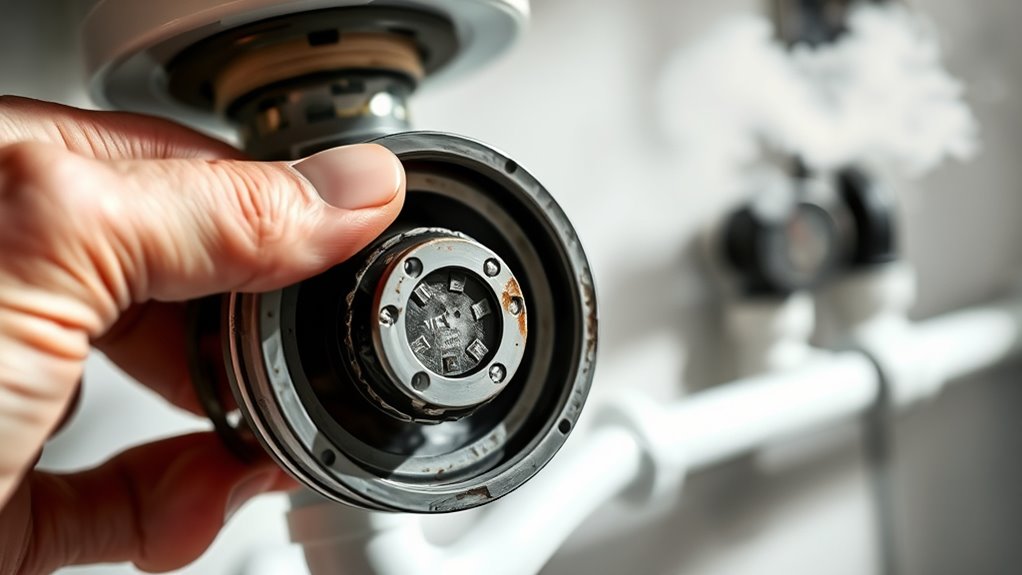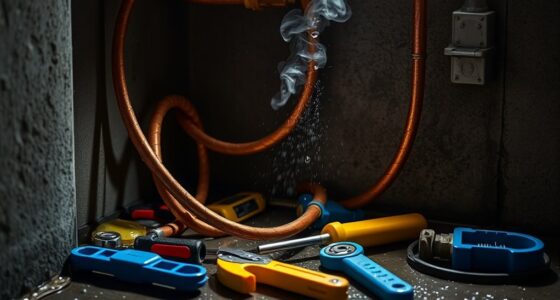If you notice a rotten egg smell after handling your filter, it could signal a gas leak, bacteria buildup, or plumbing issues. First, turn off your HVAC system safely to prevent any hazards. Check the filter and vents for debris or mold, and look for signs of gas leaks or water leaks nearby. If the smell persists or worsens, professional inspection is vital. Continuing ahead will provide you with essential steps to guarantee safety and proper troubleshooting.
Key Takeaways
- Turn off the HVAC system and ventilate the area before inspecting or replacing filters.
- Check for bacterial growth or sulfur buildup in filters and ducts causing the odor.
- Replace or clean filters regularly to prevent hydrogen sulfide accumulation.
- Look for plumbing leaks or gas leaks that may contribute to persistent rotten egg smells.
- Seek professional HVAC or plumbing assistance if odor persists despite filter maintenance.
Understanding the Causes of the Rotten Egg Odor
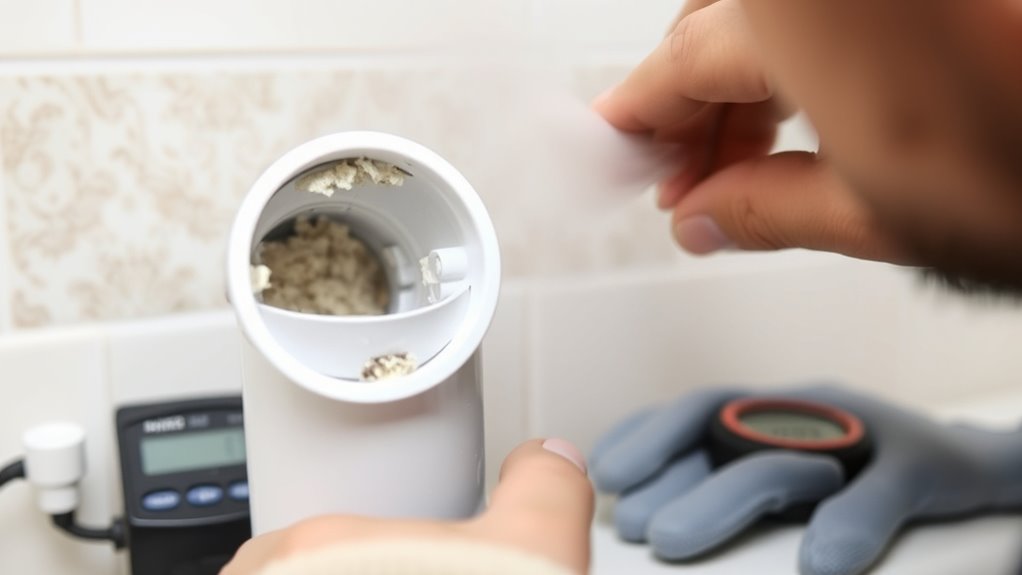
The most common cause of the rotten egg odor in filters is the presence of hydrogen sulfide gas. This gas often originates from odor sources like decaying organic matter or certain bacteria thriving in your water system. When these bacteria encounter sulfur compounds, chemical reactions occur, producing hydrogen sulfide. This gas then interacts with your filter components, releasing the familiar rotten egg smell. Understanding how chemical reactions contribute to odor formation helps pinpoint the problem. In many cases, the smell results from bacteria converting sulfates into hydrogen sulfide during filtration. Recognizing bacterial activity and how chemical reactions produce the smell helps you better diagnose and address the cause of the rotten egg odor in your filter system.
Recognizing When the Smell Indicates a Safety Issue
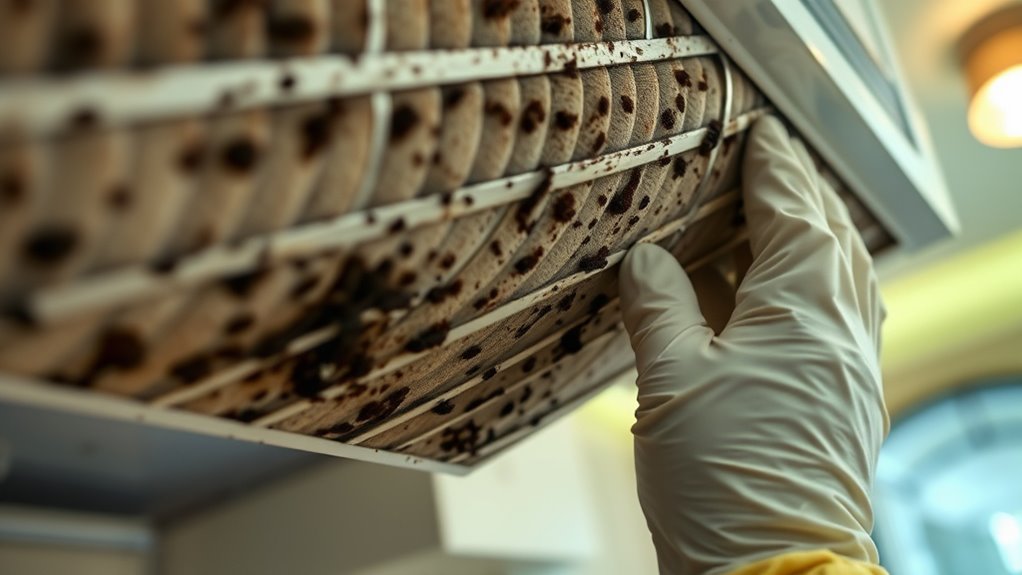
If you notice an unusual or strong smell from your filter, it could signal a safety problem. Persistent odors that don’t go away are especially concerning and shouldn’t be ignored. Recognizing these signs early helps you prevent potential hazards before they become serious. Additionally, addressing issues promptly can improve your work environment, which is especially important if you’re working remotely and rely on a safe and comfortable space.
Unusual Odor Intensity
Unusual odor intensity can be a critical warning sign that something’s wrong with your filter system. If the rotten egg smell becomes overwhelmingly strong or suddenly spikes in odor severity, don’t overlook it. A sharp increase in scent duration or a persistent, overwhelming smell indicates a potential safety hazard. When the odor intensifies beyond normal levels, it could mean the presence of dangerous gases or a malfunction in the filtration process. Pay close attention to how long the smell lasts and whether it worsens over time. If you notice a sudden surge in odor intensity, take immediate action, as it may signal a serious issue that requires prompt troubleshooting to ensure your safety. Additionally, understanding dog names can help you identify if your pet is reacting to the odor, which might indicate a more serious underlying problem.
Persistent Smell Signs
A persistent smell that lingers despite your filter’s operation often signals a serious problem. If you notice the rotten egg odor doesn’t go away, it’s a warning sign you shouldn’t dismiss.
- The smell intensifies over time, making it hard to breathe comfortably.
- You find yourself using odor masking sprays, but the smell still persists, indicating your filter may not be compatible or functioning correctly.
- The odor remains even after replacing or cleaning the filter, suggesting a safety issue rather than simple odor control.
In this case, the smell isn’t just an annoyance—it could point to dangerous bacteria or gas leaks. Recognize that persistent odors are signs your system needs urgent inspection, especially to ensure filter compatibility and safety.
Turning Off Your HVAC System Safely
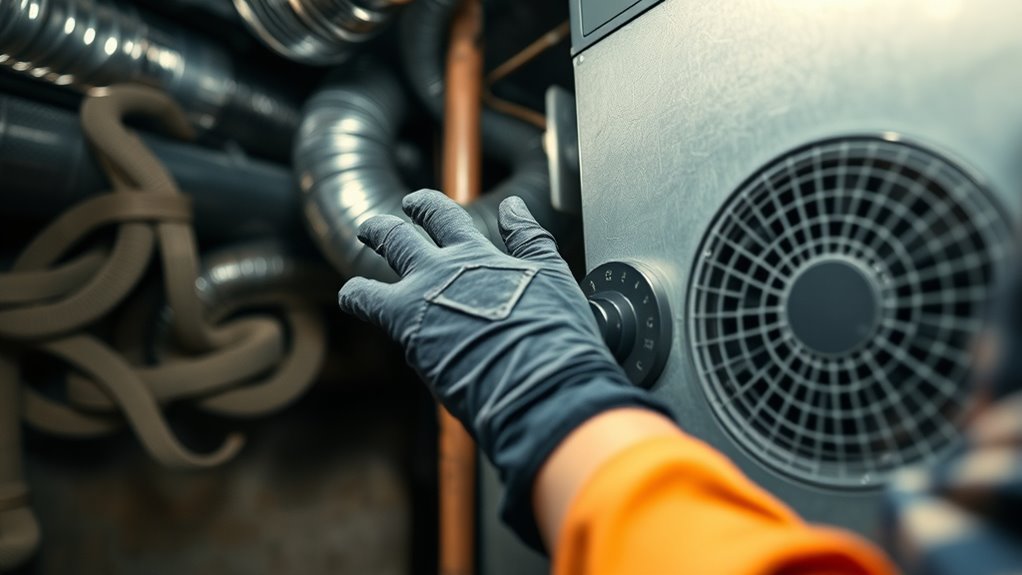
Turning off your HVAC system properly is essential for safety and equipment longevity. Before shutting down, ensure you’ve completed any necessary air filter maintenance and ventilation system checks. To turn off your system safely:
| Step | Action |
|---|---|
| 1 | Switch off the thermostat or control panel. |
| 2 | Turn off the breaker or power supply. |
| 3 | Wait for the system to fully power down. |
This prevents electrical issues and allows you to inspect components safely. Remember, always check that the ventilation system isn’t running before working on filters or ducts. Properly turning off your HVAC system minimizes risks and prepares you for troubleshooting, especially when dealing with smells or potential malfunctions. Additionally, understanding the importance of system components can help you perform more effective inspections and maintenance.
Inspecting Your Air Filter and Ventilation Components
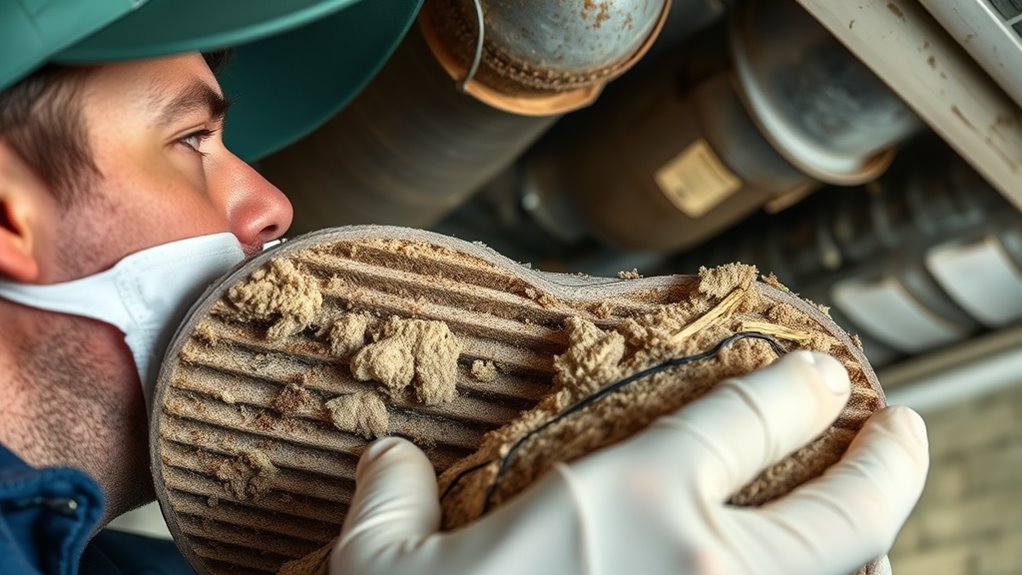
First, check your air filter to see if it’s dirty or clogged, as a dirty filter can reduce airflow. Next, examine the ventilation paths for any blockages or debris that might restrict proper circulation. If you find faulty components, replace them promptly to guarantee your system operates safely and efficiently. Additionally, inspecting for proper ventilation protocols ensures optimal airflow and reduces the risk of odors like rotten egg smell.
Check Filter Condition
How can you determine if your air filter needs replacement or cleaning? Start with a thorough filter inspection. First, look for visible dirt, dust, or debris on the air filter—it’s a clear sign it’s time for a change. Second, check if the filter feels clogged or restricted when you hold it—this indicates airflow is blocked. Third, notice any persistent odors, like rotten egg smells; these often stem from a dirty filter or ventilation issues. Don’t ignore these signs. A dirty air filter can cause poor air quality and unpleasant smells. Regular filter inspection keeps your system running smoothly and helps you catch problems early before they escalate. Additionally, understanding advances in sensor technology can help you better monitor your system’s performance. Stay vigilant, and your home’s air will stay fresh and safe.
Examine Ventilation Paths
To guarantee your ventilation system functions properly, it’s essential to examine the entire ventilation path, including both the air filter and the related components. Start by inspecting the airflow routes to ensure they’re clear of obstructions or debris. Check for any kinks, bends, or blockages in ducts that could restrict airflow. Confirm that vents and registers are open and unobstructed, allowing air to flow freely through the system. Look for any signs of damage or buildup that could impact ventilation efficiency. Proper airflow is vital for odor elimination and maintaining air quality. Additionally, understanding the importance of air quality can help you prioritize thorough inspections. By thoroughly examining your ventilation path, you can identify potential problem areas that may be causing the rotten egg smell and ensure your system operates smoothly.
Replace Faulty Components
After inspecting the ventilation pathways for obstructions, it’s important to assess the condition of your air filter and other ventilation components. Faulty filters or damaged parts can cause that unpleasant rotten egg smell. Here’s what you should do:
- Replace Old or Dirty Air Filters — neglecting air filter maintenance can lead to mold and bacteria buildup, worsening odors.
- Inspect Ventilation Fans and Ducts — damaged or clogged components may need repairs or replacements.
- Consider Ventilation System Upgrades — modern systems can better filter odors and improve air quality, preventing future issues.
Identifying Potential Gas Leaks or Plumbing Problems
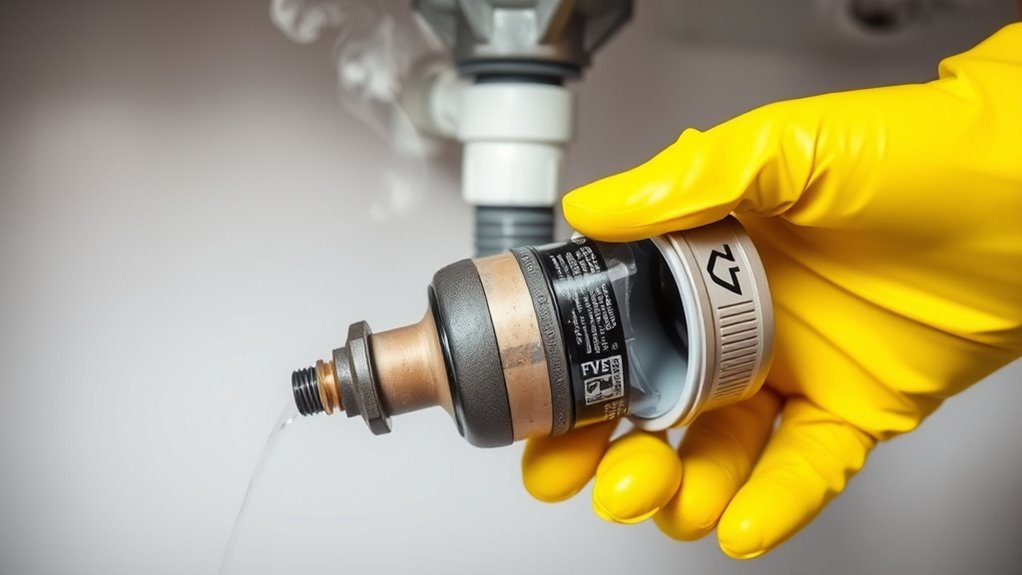
Gas leaks and plumbing problems can pose serious safety risks, so it is crucial to recognize the signs early. If you notice a persistent gas odor or suspect plumbing issues, take immediate action. Look for hissing sounds near pipes, damp spots, or unexplained water stains. These clues can indicate a leak or plumbing failure. Use the following table to identify common symptoms:
| Symptom | Possible Cause |
|---|---|
| Rotten egg smell | Gas leak or sewer problem |
| Water pooling or damp spots | Plumbing leak |
| Unexplained increase in bills | Hidden leak or pipe damage |
| Reduced water pressure | Blocked or broken pipe |
Stay alert to these signs, and prioritize safety by contacting professionals to inspect and fix the issue. Regular maintenance and awareness of local infrastructure can help prevent major hazards.
Properly Cleaning and Replacing the Air Filter

Regularly cleaning or replacing your air filter is essential for maintaining indoor air quality and HVAC efficiency. Proper air filter maintenance helps eliminate odors, including that unpleasant rotten egg smell. To do this effectively, you should:
- Check your filter monthly, especially if you notice a smell or reduced airflow.
- Replace disposable filters every 1-3 months, or clean reusable ones as instructed.
- Use odor elimination techniques like activated carbon filters or air purifiers alongside regular maintenance.
When to Seek Professional Assistance
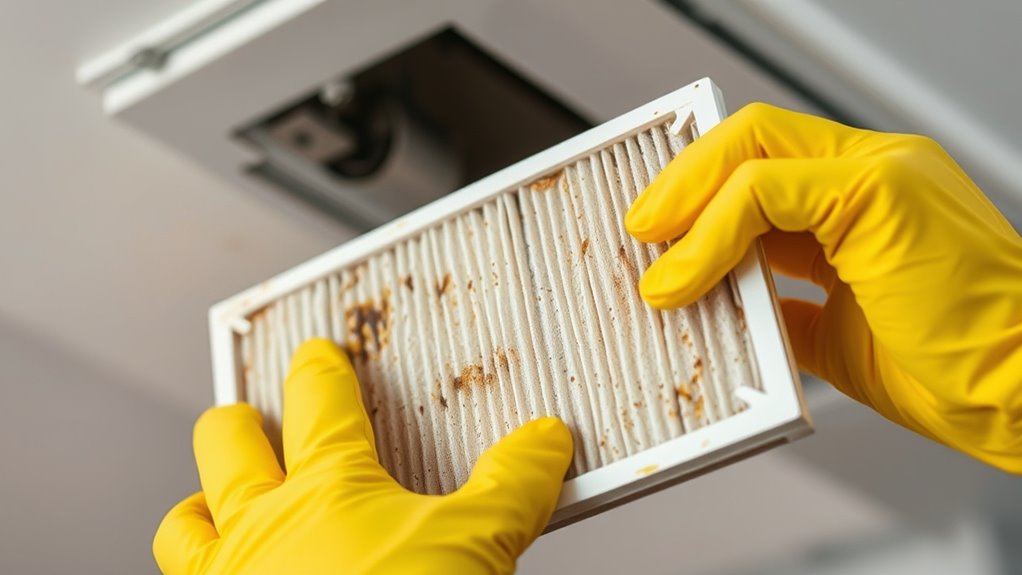
Knowing when to call in a professional can save you time, money, and potential safety hazards. If you’ve tried odor elimination techniques and regular filter maintenance but the rotten egg smell persists, it’s time to seek expert help. Persistent odors may indicate issues beyond simple filter replacement, such as duct problems or gas leaks. Professionals can accurately diagnose the source of the smell and perform essential repairs safely. Don’t ignore warning signs like unusual noises, unexplained gas smells, or worsening air quality. Attempting to troubleshoot complex problems yourself might lead to further damage or unsafe conditions. When in doubt, consulting an HVAC technician ensures proper odor elimination and safe, effective filter maintenance, giving you peace of mind and a healthier indoor environment. Additionally, glycolic acid products can be beneficial for skin renewal and addressing skin concerns, highlighting the importance of proper care and maintenance in various contexts.
Frequently Asked Questions
Can a Temporary Filter Change Eliminate the Rotten Egg Smell?
Replacing your filter with a temporary one can help temporarily reduce the rotten egg smell, but it usually won’t eliminate it completely. The new filter can improve odor removal, giving you some relief. However, for long-term results, you should identify and address the root cause, such as bacteria or sulfur compounds. Remember, a temporary filter is just a quick fix and not a permanent solution for persistent odors.
Are There Specific Air Purifiers Effective Against Sulfur Odors?
Yes, some air purifiers are specifically effective against sulfur odors. When selecting an air purifier, look for models with activated carbon filters, as they excel at sulfur odor removal. Make certain the purifier is rated for your room size to maximize performance. By choosing the right air purifier with effective filtration, you can substantially reduce or eliminate the rotten egg smell, improving your indoor air quality quickly and efficiently.
How Often Should I Schedule Professional HVAC Inspections for Odor Issues?
Imagine you notice a persistent sulfur smell in your home after using your HVAC system; this signals it’s time for professional HVAC maintenance. Generally, scheduling an inspection every 12 to 18 months helps catch odor issues early. During these visits, experts perform thorough odor diagnosis, inspecting vents, filters, and ductwork. Regular inspections guarantee your system runs efficiently, keeps odors at bay, and prevents costly repairs down the line.
Can Indoor Plants Help Neutralize the Rotten Egg Smell?
Indoor plants can help improve indoor air quality and may slightly reduce the rotten egg smell, but they aren’t a complete solution. Plants like spider plants and peace lilies absorb toxins and enhance overall air purity, offering plant benefits beyond aesthetics. However, for persistent odor issues, it’s best to address the source directly—such as inspecting your filter and ventilation system—since plants alone won’t fully eliminate the smell.
What Safety Precautions Should I Take Before Inspecting Gas Lines Myself?
You should prioritize gas line safety by turning off the gas supply before inspection. Wear protective gloves and safety goggles, and use proper inspection tools like a gas leak detector or soapy water to identify leaks. Make certain good ventilation and avoid open flames or sparks during inspection. If you’re unsure or detect a leak, contact a professional immediately. Taking these precautions helps prevent accidents and ensures your safety during gas line checks.
Conclusion
If you notice that foul, rotten egg smell lingering after filter changes, don’t ignore it. Imagine your home as a safe harbor—fading the dark cloud of gas or mold with quick action. Turn off your system, inspect your filters, and check for leaks. When in doubt, call a professional to clear the air. Taking these steps keeps your home a fresh, secure sanctuary, free from unseen dangers lurking behind the scenes.
